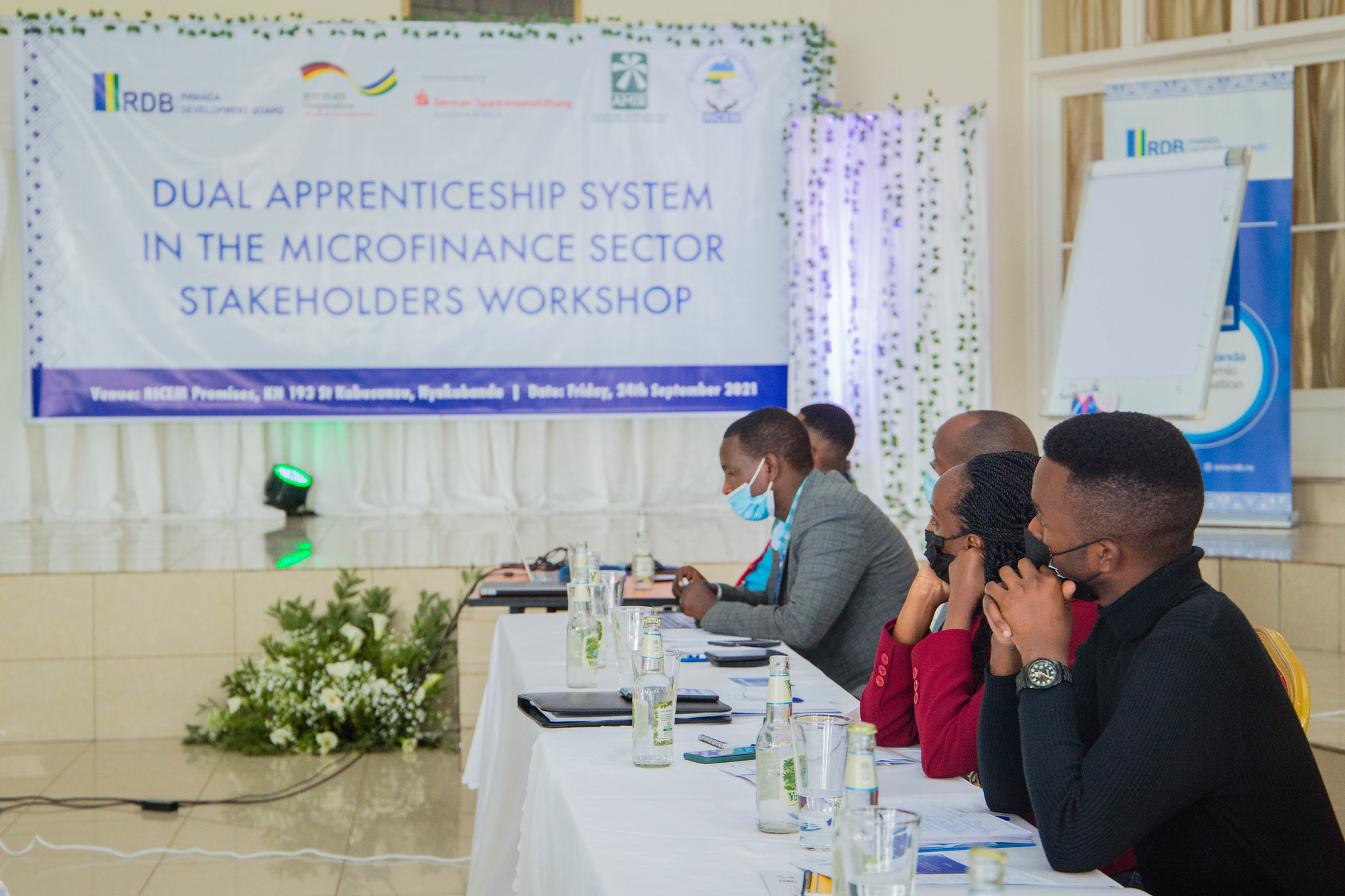

The Dual Apprenticeship System in the Microfinance Sector is a combination of workplace learning with supplementary vocational instruction implemented by AMIR (Association of Microfinance Institutions in Rwanda), RICEM (Rwanda Institute of Cooperatives, Entrepreneurship, and Microfinance), with the support of RDB (Rwanda Development Board), and DSIK (German Sparkassenstiftung for International Cooperation).
The theoretical yet practice-oriented learning takes place once a week (20%) and the rest of the working days are spent in the hosting financial institutions for practical application of the theoretical inputs (80%).
Two cohorts of the Dual Apprenticeship System in the Microfinance Sector have been conducted during a period of 3 years. 19 apprentices (fresh graduates from the RDB data base with a bachelor’s degree in fields of studies such as Management, Banking, Economics etc and Junior employees of MFIs) were certified as Microfinance Professionals after completing the training and successfully passing all the relevant exams.
The pilot stages illustrated that the dual training is valuable to the microfinance sector in Rwanda. With that, The Dual Apprenticeship System was successfully rolled-out in 18 MFIs (Microfinance Institutions) in Kigali and Rubavu with 65 apprentices (the training is ongoing).
Faustin Mwambari, the Director General in charge of Labour Research and Employment Promotion at the Ministry of Public Service and Labour, hailed the move saying that it is in line with the government initiatives for job creation through the first National Strategy for Transformation (NST1).
"We really appreciate this move which serves into the National Employment Policy, as it equips participants with needed skills for junior employees and get them a place to apply the inputs instantly,” he said.
As a matter of fact, most the apprentices in this programme were retained by their host institutions or were promoted in their respective workplaces, he added.
Francois Ngoboka, the head of targeted labour market interventions in RDB said that Microfinance institutions have been positively impacted by this apprenticeship program which they say equipped their employees with 21st century skills.
"Microfinance institutions are showing more will to have more apprentices as they need fresh graduates who are equipped with those modern market skills,” he said, adding that the move has pushed them to venture in other economic sectors other than Microfinance.


In an exclusive interview with The New Times, Maria Knappstein, the Country Director of DSIK also acknowledged the impact of this initiative and vowed to keep supporting the move.
"We really want to permanently embed this system and stabilize it so that it becomes a permanent intervention to create qualified staff members for the Microfinance Institutions.
The half-day stakeholder workshop aimed at increasing awareness of the workplace learning intervention and engaging the Microfinance Institutions to gradually take over responsibilities in securing the financial sustainability of the system".
During the workshop, Dr. Olivier Mukulira, the Managing Director of RICEM that facilitates the theoretical trainings shed light on how those apprentices are catered for.
"We train the apprentices in different microfinance service operations including cashiering and customer care, loan and credit operations, Finance and accounting, Marketing, internal audit and control, and general knowledge on microfinance institutions,” he noted.
One of the apprentices, Conseille Muramira said that the system prepared him for the work he had been doing and gained a sense of theory-application transition.
"It helped me understand the inputs I got at college. There are some aspects that I think were really hard to apply, but as I keep gaining a better experience, I obtain more skills and expertise from the dual system approach,” he said.
Apart from organizers as well as beneficiaries, microfinance institutions also testify that the dual training is valuable, primarily in terms of staff capacity advancement and securing talents, boosting the employability as well as microfinance sector performance.
They assert that it has scaled up the professionalism and growth of the microfinance sector in general.


